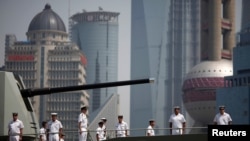Australia plans to sign a military exchange deal with U.S. ally Japan so troops from both sides could pool their firepower if needed to counter China, which has become enmeshed in disputes with Australia over the past two weeks.
Both sides said after a senior-level meeting November 17 they would sign a reciprocal access agreement next year. That deal would let forces from either side operate on the other's turf, putting Australian troops closer to U.S. counterparts who are already stationed in Japan.
The deal will help both sides bulk up in case of any conflict with China, a Cold War rival of the West that's growing out its own military and economy.
"When we develop defense ties and security ties with our neighbors and with our partners in the region, we are thinking very much about how we respond to an increasingly aggressive and assertive China that is not just content to try and spread influence but is actually attacking us in the context of political warfare and coercion," said Malcolm Davis, senior analyst in defense strategy and capability at the Australian Strategic Policy Institute in Canberra.
Australia angered China in April by calling for a probe into the handling of COVID-19. Over the past month, China stranded more than 50 Australian coal ships near its ports, placed tariffs on a string of agricultural imports and sent out a social media image suggesting that Australian soldiers were killing Afghan children.
Japan is a U.S. treaty ally of some 60 years and entrenched in a maritime sovereignty dispute with China. Australia, Japan, the United States and India belong separately to the Quad, a group that formed in 2007 for dialogue, information exchanges and military drills.
On November 17 Tokyo and Canberra agreed to negotiate the Japan-Australia Reciprocal Access Agreement (RAA), the Japanese Ministry of Foreign Affairs said on its website. Australian Prime Minister Scott Morrison was visiting Tokyo then to meet his counterpart Yoshihide Suga. Japan has no similar deals with any country besides the United States.
The two leaders issued a joint statement that omitted China by name but condemned its activities in the South China Sea, where Beijing took the upper hand in a six-way sovereignty dispute after landfilling islets for military use through 2017.
"The [leaders] had serious concerns about the recent negative developments and serious incidents in the South China Sea, including continuing militarization of disputed features, dangerous and coercive use of coast guard vessels and 'maritime militia', launches of ballistic missiles, and efforts to disrupt other countries' resource exploitation activities," the statement said.
Chinese Foreign Ministry Spokesperson Zhao Lijian slammed the statement as "a gross interference to China's internal matters."
But Beijing cannot cast the Australia-Japan pact as explicitly anti-China, said Oh Ei Sun, senior fellow with the Singapore Institute of International Affairs. "China would of course not like it, but China could not argue that it is targeting China," Oh said. "Any two countries could sign this kind of thing. A third country could not say 'it is targeting me.'"
U.S. officials, conversely, will probably smile on the Australia-Japan deal because Washington wants its allies to help with pro-American causes in Asia, said Stephen Nagy, senior associate professor of politics and international studies at International Christian University in Tokyo.
The U.S. government periodically sends navy ships to the South China Sea, upsetting Beijing, and offers weapons to Asian countries for their defense against China. Beijing maintains the world's third strongest arms forces. U.S. President Donald Trump's administration has taken on China as well over trade, technology access and consular issues.
"The fact that Australian troops can come and base here and engage in more frequent and probably deeper bilateral training with Japan and of course with the United States, because the United States is already based here, this creates more interoperability," Nagy said. "It creates a more cohesive bilateral and multilateral partnership to push back against China."
The reciprocal access agreement will mainly smooth drills and training between countries that already work together militarily, scholars say. Japanese already visit Australia for military training, for example a long-range howitzer firing exercise last year.
The two sides can learn more from each other on amphibious operations and explore areas for joint development such as long-range strike capability, Davis said.
"The significance of the RAA cannot be understated," Morrison said in a statement in November on the prime minister's website. "It will form a key plank of Australia's and Japan's response to an increasingly challenging security environment in our region amid more uncertain strategic circumstances."




